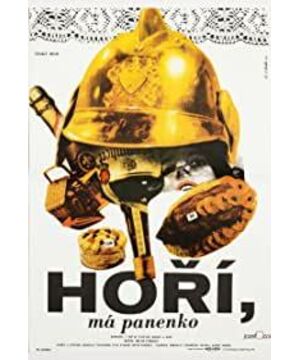Milos Forman's third feature THE FIREMEN'S BALL is the last film he made in his motherland and Oscar-nominated in the BEST FOREIGN LANGUAGE FILM category (lost to USSR's mammoth WAR AND PEACE made by Sergei Bondarchuk). It is an outright comedy masked with mordant mockery of the Communist party, the story takes place on the day when the titular ball is held to honor an 86-year-old ex-chairman of the fire brigade in a small Czech town, and real-life firemen and non-professionals constitute most of the cast.
Milos Forman is unequivocally a master of satire and an adept hand in shaping up its comical storyline inside a groaning town hall peopled with local folks, the succinct diegesis (the film's running time is merely 71 minutes) chiefly concentrates on two burlesques: a droll situation of missing raffle prizes which are overseen by a hapless fireman Josef (Kolb) and his wife (Jezková) and a firemen committee's listing up proper candidates for a beauty pageant, whose winner will have the honor to confer a honorific gift to the ex-chairman as the culmination of the evening. While the former is portrayed with a peevish overtone and somewhat plebeian rejoinders, but at least it elicits some chuckle when petty larceny is revealed within one's own household; the latter is plain lowbrow hijinks pampering for lecherous geezers,and crass to the petticoat participants (exploitative to the younger ones and disrespectful to the motherly ones), that is not what we contemplate as comedy with class.
But the film actually ameliorates itself when a fire alarm disrupts the farce where the pageant goes awry and Forman does create something aesthetically poetic with the spectacular outdoor scenes where a house is devoured by conflagration with its intractable owner wistfully looking back in consternation and on-lookers casting lugubrious looks to the loss and incandescence, then this piteous instance precipitates the final dressing-down of the tentacles of corruption and filching among the country's populace (the lights-off tactic is so accurate for those who grow up in a Communist country and of course it backfires), where the famous line, paraphrased here "the repute of the brigade over one's own integrity" becomes an obvious fair game of the censorship, it is an outright attack on the authority's inaction and state-over-people frame of mind ,one can hardly conceive it as unintentional, with its conspicuously democracy-angling slant, in hindsight it even tempts one to doubt whether Forman was deliberately concocting this film as a stepping stone for himself to bail out from the regime he can no longer consent with. A rather shrewd and dicey stratagem if it were true, and looking at where he is now? Enshrined among the rarefied two-times Oscar-winning director list with two BEST PICTURE champs under his belt, Mr. Forman is a torchbearer for many a foreign filmmaker to follow suit, whose artistic agenda is at loggerheads with stately censorship.in hindsight it even tempts one to doubt whether Forman was deliberately concocting this film as a stepping stone for himself to bail out from the regime he can no longer consent with. A rather shrewd and dicey stratagem if it were true, and looking at where he is now? Enshrined among the rarefied two-times Oscar-winning director list with two BEST PICTURE champs under his belt, Mr. Forman is a torchbearer for many a foreign filmmaker to follow suit, whose artistic agenda is at loggerheads with stately censorship.in hindsight it even tempts one to doubt whether Forman was deliberately concocting this film as a stepping stone for himself to bail out from the regime he can no longer consent with. A rather shrewd and dicey stratagem if it were true, and looking at where he is now? Enshrined among the rarefied two-times Oscar-winning director list with two BEST PICTURE champs under his belt, Mr. Forman is a torchbearer for many a foreign filmmaker to follow suit, whose artistic agenda is at loggerheads with stately censorship.whose artistic agenda is at loggerheads with stately censorship.whose artistic agenda is at loggerheads with stately censorship.
Having been revered as a landmark of Czechoslovak New Wave ever since, THE FIREMEN'S BALL is a substantially political caricature on top of its ostensible frivolousness, not without its own beguiling magnetism (the final shot is a coup de maître), yet it does trigger a lingering suspicion cannot be summarily dissipated, how much part has its ideology played in its road of canonization?
referential points: VojtechJasný's ALL MY COMPATRIOTS (1969, 7.9/10); Vera Chytilová's DAISIES (1966, 7.6/10); Karel Kachyna's THE EAR (1970, 7.7/10); Forman's MAN ON THE MOON (1999, 7.8/10) , THE PEOPLE VS. LARRY FLINT (1996, 7.8/10), AMADEUS (1984, 8.9/10), ONE FLEW OVER THE CUCKOO'S NEST (1975, 7.9/10).
View more about The Firemen's Ball reviews








